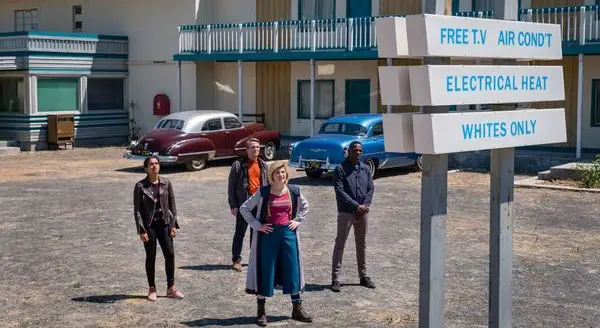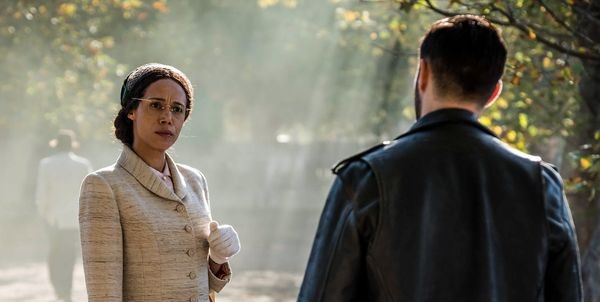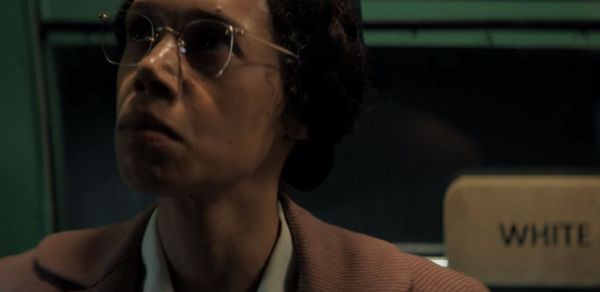DOCTOR WHO (S11E3) “Rosa”: Deep South Racism Addressed In Pivotal Episode

Scottish cinephile & feminist, with a Masters in Film &…
While the Doctor has frequented many historical moments throughout history, this episode becomes the first to show the reality of racism and segregation, while it is also the first to be written by a black woman, Malorie Blackman, in Doctor Who‘s 36 season history. The episode’s inclusion of racist language and violence also make this episode brutally honest in its depiction of 1950’s discrimination, and has arguably become of the Doctor’s most important episodes to date.
As the third episode of this 11th season of Doctor Who, it opens in 1940’s Montgomery, Alabama where a young Rosa Parks (Vinette Robinson) boards a bus through its front entrance, breaking the racial segregation law, and she is thrown off the bus by its white driver as a result.
Enter the TARDIS 12 years later in 1955, and the Doctor (Jodie Whittaker) has been attempting to get her trio of companions home to Sheffield in 2018. After finally reuniting with the TARDIS at the end of episode 2, the Doctor and her human friends jump on board to travel back to Earth. Noticing an unusual spike in “artron energy”, the Doctor wants to investigate why the TARDIS has brought them to this era, but she warns them to be careful out there in 1955 because “history is very delicate”.

When Reality Hits
Moments later the historical scene is set when Ryan (Tosin Cole), seeing someone has dropped a handkerchief, goes to return it to the couple passing by. Tapping the woman on the shoulder, he is aggressively slapped by her husband, who is enraged that a black man has approached them. Instantly we are reminded of the racism present in the context of 1950’s Alabama and the dangers this could mean for Ryan, when they are told of the recent murder of another black man. After carefully diffusing this altercation between Ryan and the white couple, Rosa Parks introduces herself to the Doctor, and they are all taken aback to meet a historical figure of such great significance to the Civil Rights Movement.
Sitting around a table in a nearby restaurant, the gang digest what just occurred, and explain to Ryan, and the show’s uninformed audience, who exactly Rosa Parks was. The Doctor, upon realising tomorrow’s date is the day when Rosa sparks the Montgomery Bus Boycotts, is still unsure of why the TARDIS brought them to this particular moment in history. A waitress approaches and tells them to leave, making it clear that Ryan and Yaz (Mandip Gill) are unwelcome and will not be served here because they are not white.
Through these interactions with people from the 1950s, Ryan and Yaz are exposed to extreme examples of racism, discrimination, and segregation. They later note how, while progress has been made since 1955, in 2018 they still experience racism in their daily lives in the UK, and their conversation about this reminds Doctor Who‘s audiences that racism is unfortunately not a thing of the past, like this episode might suggest. While Ryan tells of being stopped by police more than his white friends, Yaz explains how racist names might be shouted at her in the street walking home, and they both decide to persevere in helping the Doctor, inspired by Rosa Parks’ future accomplishments.

Racist Alien Begone
Upon discovering a suitcase filled with otherworldly gadgets, they are then attacked by a wannabe TARDIS thief Krasko (Josh Bowman) with a “temporal displacement device”. He tells them to leave or die, but the Doctor has other ideas and wants to protect history from the alien’s racist intentions. They go on to preserve the historical events, guarding the past, and ensuring Rosa’s arrest to initiate bus boycotts and the end of segregated buses in Alabama.
While the Doctor and Yaz keep Rosa busy, and Graham tracks down the infamous bus driver, Ryan is tasked with getting people on the bus itself. He comes across the racist alien blocking the road and luckily Ryan had picked up the confiscated temporal displacement gun, which the Doctor had taken from Krasko earlier. He blasts the alien into another time zone, allowing the bus to pass by on its route. While Krasko is portrayed as a racist alien from the 79th century, the reasoning for his interference with this historic event remains unexplained, causing his racism to also be presented as an inexplicable prejudice. In ridding the 1950s of this foreign racist presence, Ryan successfully saves the situation from further ruin and further racism.
Meanwhile, inside the bus the Doctor, Graham, and Yaz sit in the “white only” seating section, a physical reminder of the racist attitudes of the surrounding context. After more passengers finally board the bus, the Doctor sits quietly while the historic exchange between Rosa and bus driver plays out behind her.

Conclusion
Back in the TARDIS, the Doctor explains how difficult life became for Rosa Parks after her arrest, but how important her actions were for the ignition of the Montgomery Bus Boycott and the Civil Rights Movement. “She changed the universe,” the Doctor exclaims, also showing them an asteroid named after Rosa floating in space outside. They kept history on track, without influencing Rosa’s decision to remain seated, and in doing so they successfully protected history from any change. The episode is in-keeping with Doctor Who’s new trend for opening up discussions surrounding gender, disability, and now race, with hopefully many more progressive themes in the upcoming installments of Series 11.
A fitting tribute to Rosa Parks? Let us know your thoughts in the comments below!
The next episode of Doctor Who will air on Sunday 28 October at 6.55pm GMT on BBC One.
Does content like this matter to you?
Become a Member and support film journalism. Unlock access to all of Film Inquiry`s great articles. Join a community of like-minded readers who are passionate about cinema - get access to our private members Network, give back to independent filmmakers, and more.
Scottish cinephile & feminist, with a Masters in Film & Television Studies; currently based in Canada. Read more at http://debbiewritesreviewshere.com













